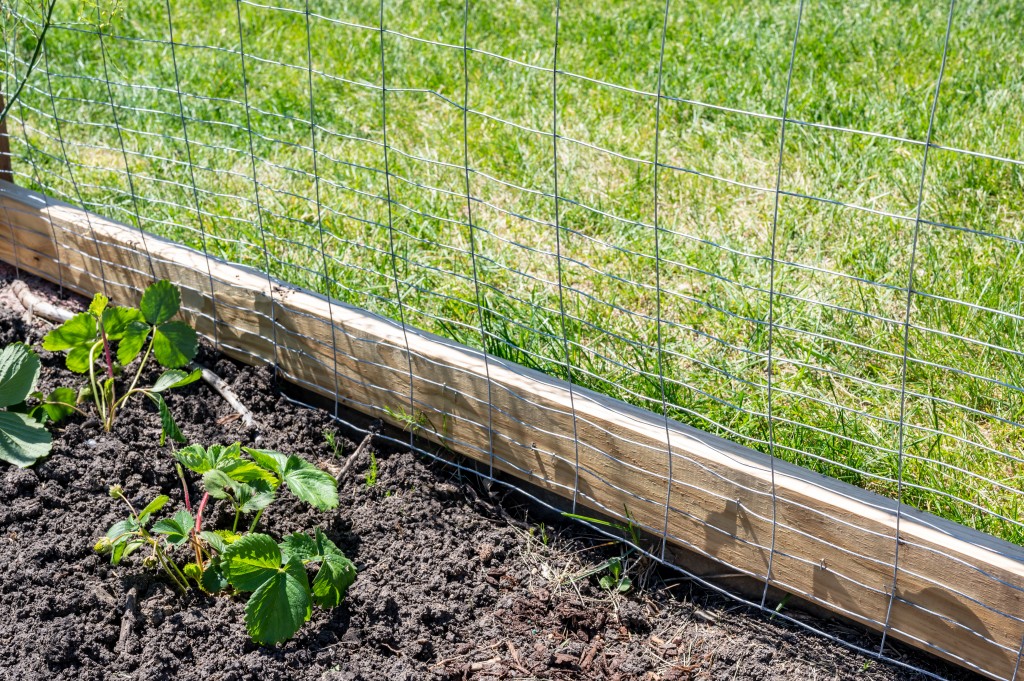Rabbit fencing doesn’t have to be that high, but must be buried at the base. Photo: Lost in the Midwest, depositphotos
By Harry Wilson
Those who love gardening know how heart-wrenching it is to see all your hard work destroyed by a wild animal in one night. If you live in an area where wild animals such as deer, rabbits, raccoons, groundhogs, stray cats and dogs often pay a visit to your garden at night—or even your own pets that think your vegetable bed is their personal playground—, then you need to take concrete steps to protect your garden. Your plants are expensive and the hard work you do to maintain your garden is costly, so don’t let wild animals ruin them.
If you are tired of animals attacking your garden, this article is here to guide you on what you can do to protect your garden.
1. Build a Fence Around Your Garden
Fencing your garden can be an effective measure to keep the wild animals out of your garden, especially at night. You can find different designs and heights to match your requirements.
If animals that are invading your privacy are small and not great climbers, such as hedgehogs and groundhogs, or don’t jump too high, like rabbits, you can use shorter fences. However, to protect your garden from bigger animals like deer, you will have to consider something higher.
Fences can create a physical barrier between your garden and outsiders, therefore helping you keep the stray animals away from your precious flowering plants, fruits, and vegetables.
2. Use a Wire Cloche
A wire cloche is a dome-like structure made of simple wire or chicken wire that creates a barrier between the plant and animal. If you notice that an animal attacks one plant in particular, you can use a meshwork of wire to protect that plant.
The animal won’t be able to grab leaves and chew on them if the plant is enclosed in a wire cloche. This is an easy remedy in case only one or few plants are under constant attack.
3. Use an Animal Repellent
There are many animal repellent options available in the market. You can get solar-powered sonic animal repellents from places like Thanos Home brand or you can get an animal repellent spray that makes the plant taste bad to the animal, thus keeping them away.
However, an animal repellent apparatus can be a better option overall than a spray, because with sprays, animals will have at least munched on a few plant parts to test them before they leave. An animal repellent device produces ultrasonic waves that are activated as soon as an animal enters the vicinity, thus keeping the animals away from the entire garden.
4. Use Prickly Mulches
If you have a cat or dog that plays on your terrace or lawn on a regular basis and want to allow them that pleasure while still protecting your vegetables, shrubs and flowers, try placing prickly mulches on the spots where you don’t want them to go. Such a mulch—it could be spruce branches, rosebush trimmings, rough bark mulch, pinecones, sharply pointed gravel or others—will keep the animal away from your vegetables and flowers, yet allow them open space where they can still enjoy themselves. Prickly mulches are particularly effective in keeping the cats away, as they really don’t like to walk on irritating surfaces.
Prickly mulches create a surface animals will hesitate to walk on and instead encourage them to stay on grassy or paved surfaces where their play does no harm. Therefore, you’ll be able to keep them out of those spots where you do want to seriously garden.
Conclusion
Wild animals and even pets can ruin your garden within seconds. If you want to protect your garden from such intruders, then you should take concrete steps to build a physical barrier between your garden and them. Fencing, animal repellents, wire cloches, and prickly mulches are just a few of the effective ways to do so.
About the Author
Harry Wilson is the Head of Digital Marketing Department at Globex Outreach. He helps clients grow their online businesses and occasionally writes blogs to share his experience with other professionals.

